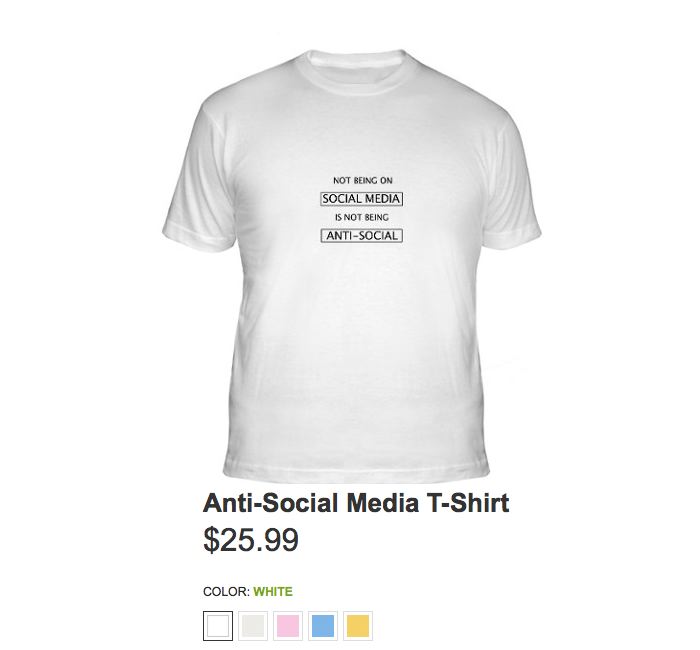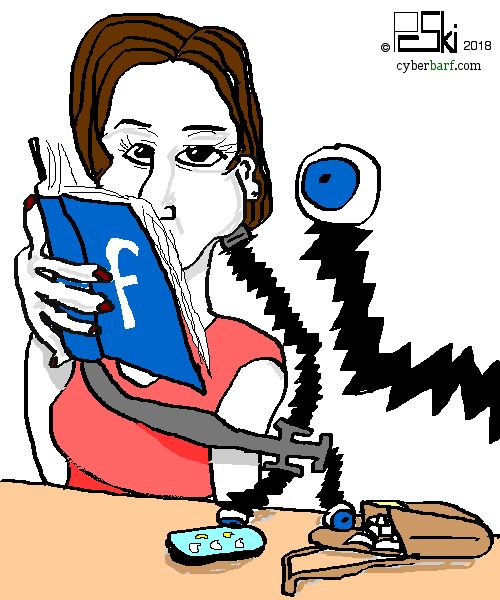|
cyberbarf VOLUME 17 NO. 10 EXAMINE THE NET WAY OF LIFE MAY, 2018 ©2018 Ski Words, Cartoons & Illustrations All Rights Reserved Worldwide Distributed by pindermedia.com, inc.
NEW EPISODE:
|
 |
|
|
|
cyberbarf FALL OF THE NET COMMENTARY The digital world is being rocked by various scandals. Twitch channel veteran TV host Kevin Pereria was banned by the platform for using view bots to enhance his view totals. This comes after two Chicago journalists, a film critic-columnist and editorial cartoonist, who used a service to boast likes by buying fake followers on their social media accounts. All these account manipulations is propulgating a falsehood on the popularity of the site. It is important that advertisers use those metrics to determine ad rates and whether to get influencers to into viral marketing programs. The internet has no certified viewership figures so companies that seel services to wrongfully boost a person's position is a real problem. Pereria, the former host of G4's Attack of the Show, launched his own content creation studio with his Twitch channel as the centerpiece for viewership, branding and patronage donations. But with most internet content providers, viewers are hard to find and capture loyalty. Pereria's channel was run like a network without the cash flow. In order to try to keep his enterprise afloat, he used viewer bots to enhance his viewership to try to get more advertising dollars. In Chicago, one columnist used a paid service to “buy” followers on his social media accounts. By adding 10,000 or more virtual followers, it falsely enhanced his stated fan base. In a profession that has truth as its foundation principle, falsely inflating one's popularity ranking is a breach of ethics warranting a suspension. Direct advertising has been pushing their products (epecially product placement) to internet and social media influencers, people who have large amount of followers. These influencers are bought to push new trends in beauty, fashion, and consumer items on their followers. The FTC has mandated that these quasi-SNS celebrities fully disclose their advertising and product promotion agreements with their viewers. It was reported that 66 percent of Twitter links were created by link bots. In addition, Player Unknown Battlegrounds Mobile edition was called out for the use of game bots (which function worse than newbies). Bolstering this theory is a March 16 article in The Verge, that charged tne major difference from the other PUBG versions is the presence of bots, apparently designed to help new players get to grips with the game. As you level up, the ratio of real players to bots increases If PUBG Mobile does have bots, that means that players on social media boasting about their initial wins might have only bested AI enemies, like a gaggle of Westworld hosts tossed into the battlefield for our amusement, as Kotaku opined recently that a victory over bots is really not a true win. In Asian countries, the sense of honor is still a highly valued principle. In South Korea, a criminal investigation has been opened against a power blogger who used similiar techniques to boost a candidate's position during the last national election. Using the internet and social media to manipulate voters is not new; the United States has been embroiled in a Russian-Trump collusion story that the President continually claims is “fake news.” Fake news is also another serious issue. With the ease of digital publishing stories in web pages, tweets or shares, false stories can seem to be real. This seems to become more prevalent because advertisers themselves have relied on stealth ads that look like normal news stories (sponsored content) to reach viewers. The concept of data mining its users has been in the spotlight from the Facebook scandal. Facebook finally admitted that private user data was obtained by a marketing team to create targeted advertising to the user and their friends. The information gathering came not from a voluntary consent form (which is required for any medical data or clinical trials) but from answers to quiz apps. But most people believe that is just the tip of the iceberg. As cyberbarf explained in its last issue, Facebook has created to data mine its users to sell data to marketing firms. Facebook, Twitter and Google are the three platforms that are three platforms that are devouring most of the digital advertising and marketing revenue. YouTube changed its payment policies to its independent creators. The change in terms of service, and reducing channels that have alleged unsavory content (filtering), have led many creators to be outraged as their revenue streams (based on views) drop to next to nothing (demonetization). One angry creator took her anger out in a shooting incident at YouTube's headquarters in California. The father of the 38 year woman shooter who was killed in the incident told the press that “she was angry,” because the company had been censoring stopped paying her. YouTubers can be paid for ads accompanying their videos, but the company de-monetizes some channels for various means ads are not run with notice to the channel owner. YouTube's new policy is a reaction to advertisers finding their ads on sites they find inappropriate. Ars Technica reported advertisers made a business choice: so long as their ads might appear on questionable videos of any kind, they stopped spending with YouTube. YouTube's response was equally extreme: a sweeping expansion of its “age-restricted” video designation and, thus, a demonetization slap on any videos that fell on the wrong side of that label. Should YouTube decide that a video runs afoul of the site's age-appropriate tag, that video is immediately ineligible for pre-roll ads which is YouTube's primary way to serve income to its creators. Content that includes Vulgar language, Violence, disturbing imagery, Nudity and sexually suggestive content, and Portrayal of harmful or dangerous activities are also subject to an ad ban. In Asia cultures, the concept of honor and fair play are still part of a public duty. South Korea has been broiled in two scandals. The first deals with a power blogger manipulating political comments. The Yonhap news service reported that the ruling Democratic Party (DP) decided to expel two members involved in an online opinion rigging scandal amid fears that the scandal could negatively affect its preparations for the June local elections. The party's Supreme Council also agreed to form a fact finding panel to look into the scandal so as to “restore the honor of the party members,” party officials said. In April, 2018, three DP members were detained for allegedly using a computer program to jack up the number of like or feel the same way clicks for comments critical of the government on news stories carried by the online portal Naver. They reportedly told police earlier that they obtained a rigging program by chance and wanted to make it look like conservatives manipulated online opinions as they tried to test the program. Among them is a blogger, surnamed Kim, who goes by an alias, “Druking.” The Druking casehas been cited as an anti-democratic act that impedes the formation of sound public opinion and threatens democracy. Naver, South Korea's main portal website and search engine, created a new set of restrictions for its online news comment system in light over the opinion-rigging scandal. Naver has capped the number of times a user can click agree or disagree on a story from 50 times within a 24 hour time period to once on a single comment, according to the Korea Herald. In addition, the number of comments a user can write on an article is now capped at three. The previous limit was 20. The second Korean on-line scandal is the rigging of real time music charts. It is a very big deal for a k-pop act to hit number one on the music charts. Brand identity and agency income flows from the popularity of the idol's music. It was recently uncovered that there was a Chinese company who would force feed streams of songs to manipulate the charts for their paying clients (presumably the artists' agencies). It came to light when a obscure rapper suddenly ranked number one over several Asian superstar groups. Chart organizers also believe that fan clubs have been manipulating sales of music. But it should be noted that some releases contain lottery tickets for enterance to special fan meeting events, so die hard fans may buy multiple copies of an EP or song in order to acquire one of these golden tickets. This procedure in itself is a form of chart manipulation. All of these issues are simmering in a pot of general distrust. The use of the internet has become a daily utility for everyone. People work, research, communicate and play on the net. But more and more people are not trusting the platforms and the information being presented to them. But this recognition comes too late for any meaningful change. A person can quit Facebook, but that will not stop other programs and apps from data mining your searches, browser history or shopping patterns. People and their data have become digital cows to be milked by big data players.
|
Rock some site WEAR. Check out our e-Store for current prices, sales and new items! Women's Clothes
Children's Items
Men's Clothes
PLEASE REVIEW E-STORE SITE FOR CURRENT SALES
|
 |
FREELANCE CARTOONS, ILLUSTRATIONS FOR NEWSPAPERS, MAGAZINE, ON-LINE DO YOU CONTENT? CHECK OUT
|
|
cyberbarf SOONER OR LATER COMMENTARY Facebook, Google, Amazon and Netflix are dominating their virtual spaces. They are sucking up revenue to the detriment to the rest of their industries. But will it last? The wired world is a fickle herd. One thing is certain: there is an uncertainty in every business model. Remember the hottest, must-see, content creative explosion . . . Vines? Well, once a platform loses its youth/trend/relevancy, it turns into a tumbleweed and rolls off into the sunset. Facebook has more than a billion users. But with the scandals about data mining, targeting ads and litigation over alleged privacy violations, what if people abandon the platform en mass? There are other platforms to pull up your virtual lawn chair to chat with friends. Brick and mortar retailers are not even trying to reorganize. Toys R Us decided to liquidate all of its assets and close all of its stores. Sears has been on life support for years. Traditional retailers have been crippled by the ease of on-line shopping. Amazon is the dominant reason why physical store fronts are obsolete (but ironically, Amazon is stepping into physical retail and grocery business). But what if some other player, like Alibaba, makes a push into North America? Or a new start up with capital to undercut Amazon's stranglehold? Or if government regulators determine there is an anti-trust issue? Success could topple Amazon from its high perch. Netflix is spending billions of dollars on acquiring and making its own content (movies and television shows). It has even started to purchase rights to Korean dramas (unsubbed and therefore eliminate secondary markets during initial TV runs). It is also starting its own foreign programming with a Korean mystery-reality show which has no connection to its prime market, North America. But can the spending of a huge amount of money equate to a significant subscriber increase to justify the costs? The internet is filled with alternative (and free) entertainment choices. Being a lost leader in the entertainment world is a blueprint to bankruptcy, as several animation studios have recently found out. The bottom line is that the general public is an untamed pack of drifting individuals in search of a fleeting common community. The internet age has made communication so easy, people have gotten lazy on their social skills. The anti-social introvert is now a growing demographic that many battle royal and twitch game streamers have tapped into for some success. When a humingbird feeder or a panda cam can generate the same million views of an expensive music video artist, one has to ask the question: what's the point? We may be on the verge of the golden age of technology but the dark ages of knowledge. The Middle Ages saw a sharp decline in general knowlege as people were only concerned about surviving the plague. The modern plague to some sociologists is the smartphone. People are addicted to their phone screens. They use it for everything, 24/7. They have hunched shoulders from leaning over the screen. They have carpel tunnel thumbs from non-stop texts and posts. They have been so distracted by technology that they have walked into traffic or off a cliff. Students have gotten lazy. Instead of traditional book reading and research, they can just “look it up on the internet.” The next generation is becoming more ill prepared for general office employment work. But the next generation will demand their elders to change with the times, even if those times are bleak. One deep recession can send an advanced tech nation into high unemployment, stagnant growth, high debt and growth of a lost class of highly educated but dispondent people (example, the high flying 1990s Japan). Adding to the issue is the fact that these aging nation's birth rates are rapidly falling below replacement level. There will be a time when the working age population is so small it cannot support the retired welfare state economy. Sooner of later, the technology boom is going to cool off. Just like any other economic bubble, it will burst. Will it be as brutal as the end of the international whaling industry with the discovery of petroleum and chemicals? Probably not. But we are all still dependent on the old, coal power grid. If the infrastructures weaken and break, the global web and its interconnected matrix of commerce could come to a crashing halt. That is one of the reason why governments and corporations are spending grat sums on cyber-defense systems against cyberattacks. People would riot against their officials if they cannot log into their social media accounts. The apocalypse may not be a religious event, but a technology disaster. |
iToons
|
|
|
 |
 |
|
cyberbarf THE WHETHER REPORT |
cyberbarf STATUS |
| Question: Whether data collection and privacy manipulations by Facebook will result in change existing laws? |
* Educated Guess * Possible * Probable * Beyond a Reasonable Doubt * Doubtful * Vapor Dream |
| Question: Whether Amazon's massive corporate welfare project for its second headquarters lead to the winning city financial hardship in the long run? |
* Educated Guess * Possible * Probable * Beyond a Reasonable Doubt * Doubtful * Vapor Dream |
| Question: Whether re-launch of Vine will die on the internet vine? |
* Educated Guess * Possible * Probable * Beyond a Reasonable Doubt * Doubtful * Vapor Dream |
|
LADIES' JAMS MULTIPLE STYLES-COLORS $31.99 PRICES TO SUBJECT TO CHANGE PLEASE REVIEW E-STORE SITE FOR CURRENT SALES
|
PRICES SUBJECT TO CHANGE; PLEASE CHECK STORE THANK YOU FOR YOUR SUPPORT!
NEW REAL NEWS KOMIX! SHOW HACK! |
 |
cyberbarf
Distribution ©2001-2018 SKI/pindermedia.com, inc.
All Ski graphics, designs, cartoons and images copyrighted.
All Rights Reserved Worldwide.











